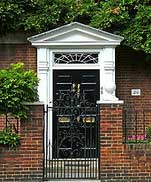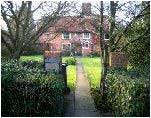Buying Real Estate in the UK (Guide)
How high are realtors´ and lawyers´ fees in the UK? What about other property purchase costs?
How difficult is the property purchase process in the UK?
There are no restrictions on foreign ownership.
Buying property
Buying property in UK can be summarized in 3 stages: the search and offer, conveyancing and the final touches.
 1. Find a suitable property and make an offer, usually through your real estate agent. The offer does not legally bind you to buy, except in Scotland where offers ARE binding (neither is the seller legally bound at this stage - ´gazumping´ or withdrawing from an agreement to buy or sell before the final contract has been signed is very common, except in Scotland).
1. Find a suitable property and make an offer, usually through your real estate agent. The offer does not legally bind you to buy, except in Scotland where offers ARE binding (neither is the seller legally bound at this stage - ´gazumping´ or withdrawing from an agreement to buy or sell before the final contract has been signed is very common, except in Scotland).
2. After your offer has been accepted you may wish to arrange for a survey. A survey is strongly advised for early detection of potential problems. Generally there are two kinds of survey:
- a building survey, which will cost you roughly £500 (€369) to £1,000 (€739)
- a homebuyer´s report, which will be cheaper at about £300 (€222) to £500 (€369)
There are no set fees for surveys. Negotiate.
3. The legal transfer of the property (conveyancing) is the next stage. You will need a solicitor or a licensed conveyor for this. Again, there is no set fee scale so negotiate, and clarify whether VAT and/or disbursements is/are included in the upfront quotation. Conveyancing proceeds through an exchange of notes between the seller´s solicitor and your solicitor. A "draft contract" will be drawn up by the seller´s solicitor containing the price, information about the seller´s deeds of title, etc.
Your solicitor will check this and negotiate with the seller´s solicitor. Searches, enquiries and surveys undertaken on your behalf will include a Local Authority Search, to check that the property is not in the way of any project; a search at the Land Registry to check security of title. Other enquiries will check on things like mineral rights, flooding, pollution, etc. This part of the conveyancing process will take a minimum of two weeks, but it not unusually takes two or three months.
4. Once you and your solicitor are satisfied, you sign final contracts. This binds both parties legally - the sale must go through. At this point you hand over a non-refundable 10% deposit.
 5. A transfer contract documenting the transfer of title will next be prepared and signed by both parties. A completion date will also be agreed upon. Between the contract signing and completion date, proper arrangements with the Land Registry office are made: stamp duty and other fees connected with registering are paid. Payments are now completed and the deeds are handed to you. The process is over, you are now a proud owner.
5. A transfer contract documenting the transfer of title will next be prepared and signed by both parties. A completion date will also be agreed upon. Between the contract signing and completion date, proper arrangements with the Land Registry office are made: stamp duty and other fees connected with registering are paid. Payments are now completed and the deeds are handed to you. The process is over, you are now a proud owner.
Selling a property
A Home Information Pack (HIP) must now be provided before properties in England and Wales can be put on the open market for sale with vacant possession (Housing Act 2004). The idea is to reduce the (large) number of abortive sales in England and Wales (28% of all ´agreed´ sales fail to take place) and is based on Danish practice.
The pack must be no more than three months old when the property is first marketed, and must contain:
- An energy Performance Certificate
- A sale statement
- A copy of the title documents for the property
- Local Authority and drainage searches
- An index
If the property is leasehold or commonhold, then the pack must also include the following:
- A copy of the lease
- Building insurance policy
- Contact details for the landlord or management and any legal details
- Regulations that apply
- Recent service charge receipts and accounts
The initial idea was to include a Home Condition Report, to reduce the cost burdens on buyers, but this was not implemented. Failure to provide a Home Information Pack, or supplying an incomplete pack carries a fine of £200 (€148).
Home Information Packs should cost between £300 (€222) to £600 (€444) for most properties in England and Wales. Some estate agents are offering HIPs for free, however the Law Society recommends you use independent HIP providers, to avoid being tied in or triggering penalty clauses.
If you are looking to buy property in Scotland these are the steps:
- hunt for the desired property
- hire a solicitor
- arrange the survey
- make the offer, if the offer is accepted you are then legally bound to complete the transfer. This ensures financial reimbursement should the seller or buyer suddenly back-out in the middle of a transaction. A buyer receives payment to cover for survey and valuation costs. The seller receives compensation for lost interest and other costs.
- go on with the conveyancing, if there no problems
- contracts are then signed
- money and deeds and keys are exchanged
The components of each step are generally similar to the processes in practice in the rest of the UK.
What are the buying and selling costs like in the UK?
Transaction Costs |
||
| Who Pays? | ||
| Stamp Duty | 0% - 12% | buyer |
| Legal Fees | 0.5% - 1% | buyer |
| Land Registry Fees | 0.05% | buyer |
| Agent´s Fees | 2% - 3.5% (+ 20% VAT) | seller |
| Costs paid by buyer | 0.55% - 13.05% | |
| Costs paid by seller | 2.35% - 4.11% | |
| ROUNDTRIP TRANSACTION COSTS | 2.90% - 17.16% | |
| See Footnotes Source: Global Property Guide |
||
Footnotes to Transaction Costs Table
The round trip transaction costs include all costs of buying and then re-selling a property - lawyers´ fees, notaries´ fees, registration fees, taxes, agents´ fees, etc.

 Legal Fees:
Legal Fees:
Solicitors and conveyancers fees are based on the amount of time spent on the transaction. It is generally negotiable and varies a lot. Others charge a fixed amount while others charge a percentage of the sale price (around 0.5% to 1%).

 Stamp Duty:
Stamp Duty:
The buyer must complete, sign, and lodge a Land Transaction Return together with the Stamp Duty Land Tax (SDLT) within 30 days of completion. Some areas of the country are exempt from stamp duty. The Inland Revenue website (http://www.hmrc.gov.uk/so/buy-house.htm) has a list of stamp duty exempt areas.
Stamp duty is determined as follows:
STAMP DUTY ON RESIDENTIAL PROPERTIES |
|
| PROPERTY VALUE, £ (€) | RATE |
| Up to 125,000 (€166,667) | 0% |
| 125,000 - 250,000 (€333,333) | 2% |
| 250,000 - 925,000 (€1,233,333) | 5% |
| 925,000 - 1,500,000 (€2,000,000) | 10% |
| Over 1,500,000 (€2,000,000) | 12% |

 Land Registration Fee
Land Registration Fee
Land registration fee is around 0.05% of the property value.
LAND REGISTRATION FEE |
|
| PROPERTY VALUE, £ (€) | RATE £ (€) |
| Up to 50,000 (€66,667) | £40 (€53) |
| 50,000 - 80,000 (€106,667) | £70 (€93) |
| 80,000 - 100,000 (€133,333) | £120 (€160) |
| 100,000 - 200,000 (€266,667) | £190 (€253) |
| 200,000 - 500,000 (€666,667) | £270 (€360) |
| 500,000 - 1 million (€1,333,333) | £540 (€720) |
| Over 1 million (€1,333,333) | £910 (€1,213) |

 Real Estate Agent´s Fee:
Real Estate Agent´s Fee:
Real estate agent fees are generally negotiable. The commission is typically lower if there is only one estate agency involved. In cases of multiple agency agreement,where several estate agents compete to sell your house, agent´s fees are typically higher. VAT of 20% is imposed on agent´s commission.